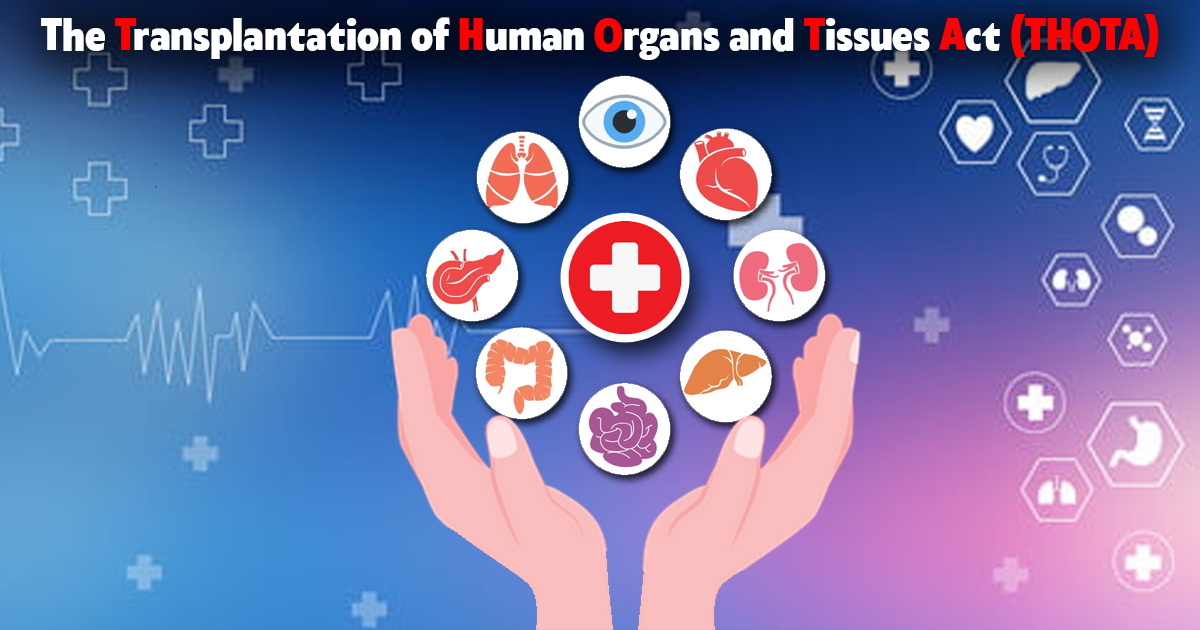
Concept
The Transplantation of Human Organs and Tissues Act (THOTA) was enacted in India in 1994 to regulate organ donation, retrieval, and transplantation. It aimed to prevent commercial dealings in organs and ensure ethical practices in organ transplantation. However, despite its noble intentions, several challenges persist in its implementation.
Provisions of THOTA:
- Definition of Terms: THOTA defines various terms such as “brain-stem death,” “donor,” “hospital,” etc., providing clarity in legal proceedings related to organ transplantation.
- Authorization Committees: The Act mandates the establishment of Authorization Committees at the state and national levels to oversee and regulate organ transplantation procedures, ensuring compliance with ethical standards.
- Regulation of Transplantation: THOTA regulates the removal, storage, and transplantation of human organs and tissues. It prohibits commercial dealings and mandates authorization for transplantation.
- Penalties: The Act prescribes stringent penalties, including imprisonment and fines, for contravening its provisions, thereby deterring illegal practices in organ trafficking.
Problems and Challenges:
- Organ Shortage: Despite legal provisions, there remains a significant gap between organ demand and supply in India, leading to prolonged waiting lists and increased mortality rates among patients awaiting transplantation.
- Commercialization: The commercialization of organ transplantation continues to be a concern, with reports of illegal trafficking and exploitation of vulnerable individuals for monetary gain.
- Ethical Concerns: Ensuring informed consent and ethical practices in organ donation and transplantation remains challenging, especially in cases involving deceased donors and marginalized communities.
- Infrastructure and Awareness: Limited infrastructure, inadequate medical facilities, and lack of awareness about organ donation further hinder the effective implementation of THOTA.
What can be done:
- Promoting Deceased Organ Donation: Efforts should focus on promoting deceased organ donation through public awareness campaigns, sensitization programs, and strengthening the infrastructure for organ retrieval and transplantation.
- Enhancing Legal Framework: Amendments to THOTA should be considered to address loopholes and strengthen its enforcement mechanisms, including stricter penalties for violations and improved regulatory oversight.
- Capacity Building: Training programs for healthcare professionals, including transplant coordinators and surgeons, should be intensified to ensure adherence to ethical standards and procedural protocols.
- Public-Private Partnerships: Collaborations between government agencies, non-profit organizations, and private healthcare institutions can facilitate the establishment of robust organ donation and transplantation networks, expanding access to transplantation services.
- Research and Innovation: Investing in research and innovation in the field of organ transplantation, including alternative methods such as xenotransplantation and organ bioengineering, can potentially address the organ shortage crisis in the long term.
while THOTA lays down the legal framework for regulating organ transplantation in India, addressing the persistent challenges requires a multi-pronged approach involving legislative reforms, capacity building, public awareness, and innovative solutions to ensure equitable access to transplantation services while upholding ethical principles.
 Chinmaya IAS Academy – Current Affairs Chinmaya IAS Academy – Current Affairs
Chinmaya IAS Academy – Current Affairs Chinmaya IAS Academy – Current Affairs
